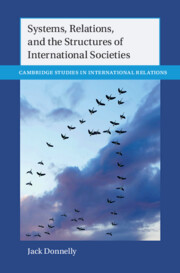Book contents
- Systems, Relations, and the Structures of International Societies
- Cambridge Studies in International Relations
- Systems, Relations, and the Structures of International Societies
- Copyright page
- Contents
- Figures
- Tables
- Acknowledgments
- Part I Systems, Relations, Levels, and Explanations
- Part II Waltzian Structural Theory
- 5 Structural Theory
- 6 Anarchy
- 7 The Tripartite Conception of Structure
- 8 Functional Differentiation and Distribution of Capabilities
- 9 Ordering Principles
- Part III Systems, Relations, and Processes
- References
- Index
- Cambridge Studies in International Relations
9 - Ordering Principles
from Part II - Waltzian Structural Theory
Published online by Cambridge University Press: 19 October 2023
- Systems, Relations, and the Structures of International Societies
- Cambridge Studies in International Relations
- Systems, Relations, and the Structures of International Societies
- Copyright page
- Contents
- Figures
- Tables
- Acknowledgments
- Part I Systems, Relations, Levels, and Explanations
- Part II Waltzian Structural Theory
- 5 Structural Theory
- 6 Anarchy
- 7 The Tripartite Conception of Structure
- 8 Functional Differentiation and Distribution of Capabilities
- 9 Ordering Principles
- Part III Systems, Relations, and Processes
- References
- Index
- Cambridge Studies in International Relations
Summary
This chapter begins by looking at Waltz’s other political ordering principle, hierarchy – which, like anarchy, is not in fact an ordering principle. Saying that a system “is hierarchical” merely indicates that it has some unspecified set of relations of stratification and functional differentiation. “Hierarchy,” rather than a structural ordering principle, is a residual category of non-anarchic orders (that, like most residuals, obscures the diversity of the “things” lumped together). And, as the preceding chapters have shown, most international systems, which by definition are anarchic, are also hierarchical. Therefore, even if anarchy and hierarchy are ordering principles, international systems do not have singular ordering principles. The remainder of the chapter looks critically at recent efforts by Ryan Griffiths and by Mathias Albert, Barry Buzan, and Michael Zurn to develop alternative accounts of political ordering principles. I conclude that the problem is not that Waltz has misidentified the ordering principles of international systems but that international systems do not have ordering principles.
Keywords
- Type
- Chapter
- Information
- Publisher: Cambridge University PressPrint publication year: 2023

